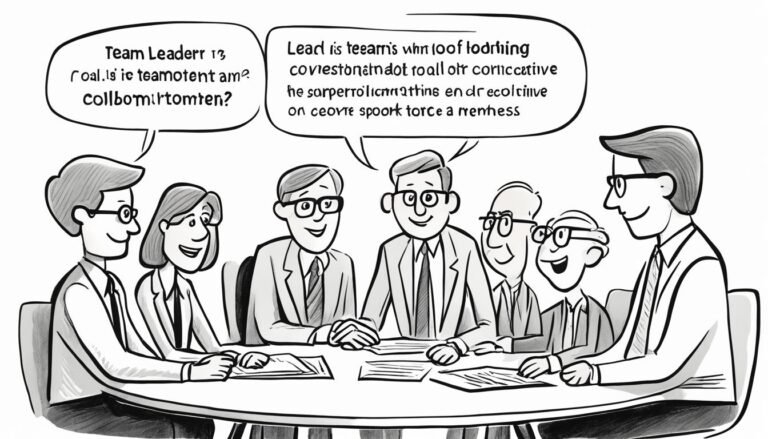Leadership Empowerment: Cultivating Ownership
“Leadership is not about being in charge. It is about taking care of those in your charge.” – Simon Sinek
True leadership is more than just giving orders. It’s giving people the power to own their work. This means letting them make choices and help the company succeed.
Having a mindset of ownership is key. It boosts performance, sparks new ideas, and helps the company grow for the long haul.
Key Takeaways:
- Leadership empowerment is about taking care of those in your charge.
- Cultivating an ownership mindset within teams drives performance and innovation.
- Empowering individuals leads to long-term organizational growth.
The Importance of Ownership Mindset
An ownership mindset is key for success in any group. It means more than just doing what you’re told. It’s about taking charge of your work and making choices to get the best outcomes. With this mindset, people are more involved, motivated, and work harder. This leads to better results.
This mindset makes us feel responsible for what we do. Instead of just following orders, we own our work and help make important decisions. We know our choices affect our team’s and the whole organization’s success. So, we step up to take responsibility for the outcomes.
“Ownership is not only about taking responsibility, but it’s also about having the autonomy to make decisions that will drive the desired outcomes. It empowers individuals and encourages them to take initiative, be proactive, and contribute to the overall success of the organization.”
Being accountable is crucial with an ownership mindset. We’re not just responsible for how well we do, but also for our team’s success and our company’s overall performance. We get the importance of timing, keeping our word, and doing our part. This builds a team that can be trusted and depended on.
Having the power to make decisions is also a big part of an ownership mindset. It makes us quicker and more creative. We can see what’s needed, find new chances, and choose the best steps for our company. This quick thinking lets us adjust fast, take chances, and grow.
Having an ownership mindset is good for each of us and for our company. When we really own our work, we strive to do better and help our team succeed. This attitude makes everyone happier and more focused, leading to more work getting done and better team spirit.
Key Attributes of an Ownership Mindset
| Attributes | Description |
|---|---|
| Responsibility | Taking accountability for outcomes and results. |
| Autonomy | Having the freedom to make decisions and take initiative. |
| Accountability | Being responsible for individual and collective success. |
| Decision-making | Making informed choices that align with organizational goals. |
| Innovation | Proactively seeking opportunities for improvement and growth. |
It all starts with leaders. They need to inspire and enable an ownership culture. This means good communication, chances to grow professionally, and a work environment that supports everyone. By pushing for an ownership mindset, organizations can get the best out of their teams and find lasting success.
The Consequences of a Lack of Ownership
When groups don’t foster ownership, the effects are big. they hit parts of their work hard. A main fallout is a confused user journey. Customers face inconsistencies or gaps in their dealings. This happens when there’s no ownership feeling. People won’t step up to fix these problems. This leads to a bad experience that can anger or push away customers.
Without ownership, a “tragedy of the commons” may happen. This is when people just look after their own stuff. They don’t think about how it affects the whole group. It can split teams up. They work alone, having different goals.
Falling short is another result of not feeling responsible for the outcome. This makes folks less eager to do more. They might not fix issues or work better. This means lost chances, less work done, and lower quality.
Also, low ownership can make workers unhappy. When they can’t make choices or add to their group’s success, they fade. This leads to less drive, more people leaving, and a bad vibe at work.
But, ownership leads to solving problems and growing a business. It helps in changing times.
Disjointed User Experience
A messy user journey can hit an organization badly. If clients see problems or holes in their experience, trust drops. They might think the brand doesn’t care or isn’t skilled. This can lose customers and make others unhappy.
Underperformance and Missed Opportunities
Not feeling ownership can make people less likely to do more. This leads to not doing well, missing goals, and losing chances to get bigger. It can make a company not challenge others. This puts the company behind in the market.
Decreased Employee Morale and Turnover
When workers can’t make choices or own their work, they’re less happy. They may not care, making less work get done. They might leave their jobs more. Lots of them leaving can be costly and shake the team’s spirit.
Not owning one’s actions shakes a company in many ways. To not go this route, leaders should make their teams feel like owners. They should push for being responsible and feeling all part of the success. This way, companies can make the most of their people. They will work better and feel good about it.
Benefits of an Ownership Mindset
An ownership mindset has lots of benefits for people and groups. It leads to better agility, more innovation, and higher morale. This helps organizations do better and achieve more.
Increased Agility
Having an ownership mindset lets teams make their own choices and work together well. Individuals take the lead and adapt fast to new situations. This agility helps companies handle problems quickly, find new chances, and lead the pack.
More Innovation
Owning your work encourages people to be brave and think in new ways. It supports team members to try new things and find creative solutions. This boosts innovation, leading to new products, solutions, and ways of doing things. It all helps the company grow and succeed.
Higher Morale
An ownership mindset shows people they matter and belong. It makes a happy workplace where everyone does their best. Feeling connected to their work helps boost morale and job happiness. This makes people more involved, productive, and proud of what they do.
“An ownership mindset allows teams to make independent decisions, fostering increased agility and adaptability.” – John Hargreaves, CEO of InnovateNow
Cultivating an ownership mindset unleashes teams’ full capabilities. It brings better agility, letting teams handle change smoothly. It encourages creative thinking for innovative solutions and growth. Also, everyone works together more as they feel part owners, aiming for common success.
Instilling an Ownership Mentality
To get teams to think like owners, changing how they view their work is key. Instead of just focusing on finishing by a certain date, they need to aim for ongoing success. This means really seeing the results of their work over time.
Leadership is essential in this shift. They should let team members closer to the task make big calls. This approach lets people feel responsible for the end results. It boosts their motivation, knowing they are making decisions that matter.
Sharing everything openly helps, too. When everyone knows the ‘why’ behind decisions and goals, they can make better choices themselves. It also builds a strong team feeling. This way, everyone is on the same page, working together towards common goals.
Cultivating a Product Mindset
Moving from project thinking to product thinking is about looking at the bigger picture. It’s not just about the deadline but also about long-term success. This way, everyone feels more involved in the product’s journey, not just its finish line.
“Shifting to a product mindset has allowed our team to think beyond individual tasks and deadlines. We now prioritize delivering value and solving customer problems over simply completing projects.”
Delegating Decision-Making
Letting team members make decisions is crucial. It spreads out the responsibility and trusts them to choose wisely. It encourages them to bring their best to their work, knowing they have a say.
This method also makes team members feel important. Being trusted with decisions makes them want to do even better. They feel like they are crucial to the team’s success.
Openly Sharing Information
Being open and honest is vital in making a group think like owners. It breaks down barriers and promotes working together. This way, everyone can add their bit towards smarter decisions.
Having open lines of communication also promotes a trusting environment. This lets team members speak up without fear. They can share their thoughts freely, which leads to great ideas and improvements.
By changing how teams view their work, letting them decide, and sharing everything openly, leaders can really make a difference. This approach brings people closer to their work, making them care more. The result is a more engaged and successful team all around.

The Impact of Empowerment on Individual Performance
Empowerment is key in making people work better in companies. When people are given power, they are more motivated and engaged. This leads to them being happier with their jobs. They also get to share their ideas more. This makes them more creative and brings new ideas to the table.
Organizations gain a lot when they empower their workers. Employees start feeling like their work belongs to them. This makes them take more chances and work better. They can make decisions based on what they know best. This helps the whole company do better.
A Harvard Business Review study showed that empowered workers are more likely to care about their jobs. They also tend to work harder. They are 53% more productive than those who aren’t given power. The study proves that empowering people works.
“Empowerment is the key to unlocking individual potential and driving innovation within organizations. When individuals feel trusted and empowered, they become more invested in their work and go above and beyond to achieve excellence.”
Empowerment helps make a workplace where everyone feels important. This makes people like their jobs more. When they like their jobs, they stay and work harder. This helps companies keep good workers and makes fewer people leave their jobs.
For more proof of how power makes people do better at their jobs, look at these examples:
Example: Motivation and Engagement
Brian is a worker at XYZ Corporation who has a lot of freedom in his projects. This makes him care more about his job, and he does really well. He often does better than expected, comes up with great ideas, and works hard with his team.
Example: Job Satisfaction
At ABC Company, Jennifer leads new marketing projects. She feels important and well supported. This makes her like her job a lot. Because of this, she always looks for ways to make the company’s marketing better. The results are great for the company.
Example: Creativity and Innovation
At DEF Agency, Michael is encouraged to be creative. He is not afraid to try new things. This freedom makes his designs stand out. His work brings in new clients and makes the agency more successful.
Empowerment is a big deal in making people work harder and better. It helps with motivation, job satisfaction, and bringing new ideas. By letting people make choices and be creative, companies get the best out of their workers. This builds a great workplace.
The Impact of Empowerment on Team Performance
Empowerment is key for better team work. It boosts collaboration, adaptability, and keeps employees happy. When team members feel they have power, they work better together. They share ideas and help each other meet goals. This makes the team more productive and creative.
Empowered teams are good at handling changes. They can change their plans and ways quickly. This skill helps them face challenges and find new chances to grow and succeed.
Empowerment also helps keep people in their jobs. When folks feel their work is important and their place is secure, they stay longer. Creating a positive work place, where people feel like they matter, is all thanks to empowerment. It boosts joy at work and lowers turnover, which is great for the company.
Benefits of Empowerment on Team Performance:
- Enhanced collaboration and teamwork
- Improved adaptability to change
- Increased employee retention rates
To show how much empowerment helps, look at this table:
| Empowerment Factor | Impact on Team Performance |
|---|---|
| Teamwork and Collaboration | Enhances synergy and collective problem-solving |
| Adaptability to Change | Enables quick adjustment to new circumstances |
| Employee Retention | Reduces turnover and boosts team stability |
This table proves that empowerment is key for many parts of team success. It shows how important a culture of empowerment is for any company.
Empowerment as a Leadership Tool
Empowerment is a key for leaders. It helps improve team and individual performance. Leaders find more time for important tasks when their team members feel empowered. This means they don’t have to give as much approval and guidance.
This extra time allows leaders to focus on strategic work. They can also focus on developing new leaders. So, everyone benefits when team members are given empowerment.
Key Benefits of Empowerment in Leadership
“Empowerment is not about micromanagement; it’s about trust and nurturing the potential of others.” – Richard Branson
Empowerment brings many advantages in leadership. It makes organizations more efficient. It allows team members to take on challenges and responsibilities.
With this in mind, leaders have more time for important decision-making. They can also plan for the future. This kind of leadership sets the stage for growth and development.
It builds a culture of trust and innovation. Different people come together to solve problems in creative ways. By giving out authority and sharing responsibilities, leaders encourage their teams to grow.
Unlocking Leadership Potential
Empowerment helps current leaders and future ones. By empowering their teams, leaders help them grow. They offer chances to make decisions and lead projects.
As a result, a new generation of leaders is born. This way, leadership always moves forward, with new people ready to take charge.
Achieving Balance with Empowerment
Leaders must find a balance in empowerment and accountability. Empowering teams is great, but it must come with clear goals and regular checks.
This ensures everyone stays on track. But, it also gives team members the freedom to act on their own. In this way, everyone knows what to do, but they’re also encouraged to take initiative.
| Benefits of Empowerment in Leadership | Ways to Free Up Leaders’ Time |
|---|---|
| 1. Increased individual and team performance | 1. Delegate authority to team members |
| 2. Improved employee engagement and motivation | 2. Foster a culture of autonomy and initiative |
| 3. Enhanced creativity and innovation | 3. Encourage self-managed teams |
| 4. Development of future leaders | 4. Implement effective decision-making processes |
| 5. Effective utilization of leaders’ time for strategic tasks | 5. Streamline communication channels |
Empowerment is the key to unleashing a team’s full potential. It leads to a culture where everyone takes ownership. This approach drives both personal and organizational success.
Conclusion
Having an ownership mindset and empowering leaders are key for success at any organization. They lead to more transparency and let people work autonomously. Also, they help companies understand their customers better.
Letting leaders empower their teams is very important. Leaders should let their team members take charge of what they do. This helps everyone work better. It also means leaders can focus on big picture tasks and help their teams grow.
In the end, focusing on leadership and ownership helps organizations do better. It creates a place where working together, being flexible, and staying with the company are natural. Leaders can make a workplace where everyone wants to do their best. They do this by letting their team leaders take ownership and work without constant supervision.
FAQ
How can leaders cultivate an ownership mindset within their teams?
Leaders can build this mindset through clear and honest communication. They should let team members make decisions. Also, teams should think about what customers need.
What is the importance of an ownership mindset?
Having an ownership mindset is key. People who think this way take charge and act. This boosts how much they care, their drive, and what they achieve, making the team successful.
What are the consequences of a lack of ownership within an organization?
Not owning problems can make things go wrong. Work might not be done well. This can harm how happy customers are, and how well work gets done.
What are the benefits of an ownership mindset?
Thinking like an owner helps in many ways. It makes a team quick and creative. It boosts everyone’s spirit and makes them feel important. This leads to good results and strong teamwork.
How can leaders instill an ownership mentality?
To get everyone to act like owners, leaders should change their focus. They should let others make choices and share what’s happening in clear ways. This way, the people know what’s important and can decide better.
How does empowerment impact individual performance?
Feeling empowered sends people’s work up. They do more because they want to, not just because they’re told. It also makes them come up with new and better ideas, since they have the freedom to.
What is the impact of empowerment on team performance?
Empowered teams work together well and change fast when needed. They’re good at sharing, helping each other, and doing their best. Plus, they stick around longer because they’re happy.
How can leaders use empowerment as a tool?
Leaders make things better for their teams by empowering them. It improves both personal and group work. Leaders can then focus on what’s next, helping their team grow.
What is the importance of leadership empowerment and cultivating ownership?
Empowering leaders and teams is vital for winning. It makes people work harder and better, and they’re happier too. Leaders must guide this effort, making sure everyone owns their part and works for the same goal.








